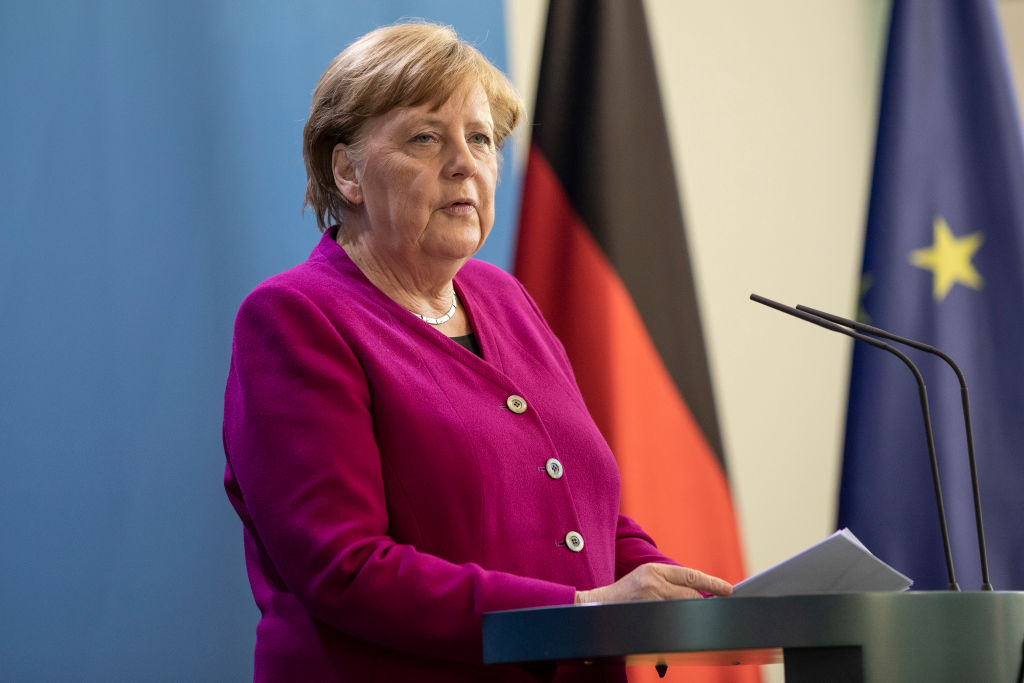The European Union has done it again. Last Thursday, member states agreed on an aid package of more than half a trillion euros (£436bn). A good portion of that money will be used to revitalise the economies in Italy and Spain, the two European countries that have suffered the most deaths due to the virus so far. But the recovery fund was only made possible because the agreement avoided an explicit mention of jointly-issued debt, which has been anathema to Germany, Finland or the Netherlands. ‘It is impossible that debt could be communitised’, Angela Merkel said after the package was announced. The German chancellor and other state leaders oppose ‘coronabonds’, arguing that such a concept would punish those countries, like Germany, that have built up reserves during good times.
But that view isn’t universal among European leaders. ‘If Europe does not rise to this unprecedented challenge, the whole European structure loses its raison d’être for the people,’ said Italian prime minister Giuseppe Conte in March. What Conte envisions as raison d’être is financial solidarity and especially support of weaker member states, not only during an extraordinary crisis but in general. The strong economies are supposed to fund the weaker ones, creating a level playing field within the EU.
That’s not what the strong economies have in mind. The strongest of them all, Germany, may praise the EU as a peace project and geopolitical player with the potential to stand up to superpowers, but more importantly it views the EU as a single market for its export-oriented companies and industries in need of cheap labour. The reason German manufacturers have been thriving is partly due to the export of goods to EU member states; the reason the German healthcare system works well on a relatively low budget is partly due to the immigration of eastern European doctors. That’s why Berlin continues to fund the EU, albeit ever-so-slightly more reluctant.
Since his 2017 election victory, parts of the European media have praised French president Emmanuel Macron for his pro-European stance, arguing that he seems more committed to the implementation of joint EU policies than Angela Merkel. But Berlin knows that much of the talk about common strategies and solidarity is just rhetoric. Macron has, again and again, pledged to fight selfish nationalism and put the EU above individual interests. He grandly talks about European solidarity, but when a deal for some financial leeway for France is possible, he will cut that deal for the sake of his people. Still, the ruler in the Élysée Palace has a way to appear as a visionary who is above ‘nationalistic narrow-mindedness’.
Similar to the aftermath of the 2008 financial crisis, it is Germany that is viewed as the villain in Europe’s south. Government officials vividly remember how Merkel was caricatured as a Hitler-like figure by Greek media back then. This time, factions in Italian politics have publicly lashed out at Germany because Berlin dared to put some thought into a scenario in which Italy would have to obey to debt reduction regulations if it had to apply for loans through the European Stability Mechanism (ESM).
Without the ESM, Italy could be forced to borrow money at high-interest rates on the free market. A cheap loan through the ESM would contain a transfer element, as European taxpayers are ultimately liable for the ESM. That fact creates concerns in Germany because German taxpayers carry a proportionally high load within the union. After Berlin started discussing political conditions under which financial assistance should be granted, Lega’s federal secretary Matteo Salvini and other politicians in Rome were prompted to accuse Germany of attempting to take away Italy’s political sovereignty.
After all, the EU member states agreed on potential ESM loans for Italy and others without any additional rules loan recipients have to follow, provided that the money is only used to meet direct and indirect costs stemming from the health crisis. But such an agreement does not mean the political gap between Germany and Europe’s south is bridged entirely.
‘A joint solution is in Germany’s interest, because things can only go well for Germany if they go well for Europe,’ Merkel told the press last week in an attempt to justify the recovery fund and ESM loan scheme to her people. However, she cannot hide the fact that Germany remains wary about the unbalanced burden-sharing in the EU. The most obvious proof point is that the EU has been split over the budget for more than a year, with major contributors such as Germany reluctant to fill the estimated 75-billion-euro (£65bn) spending gap left by Britain’s departure from the EU.
Despite how rational Merkel and many government officials in Berlin usually are, it will not make them any more willing to bankroll the EU and European economies if they have to put up with constant attacks from Rome, Madrid and elsewhere. So whatever happens next, one thing is already clear: coronavirus is breathing new life into old European divisions.






Comments